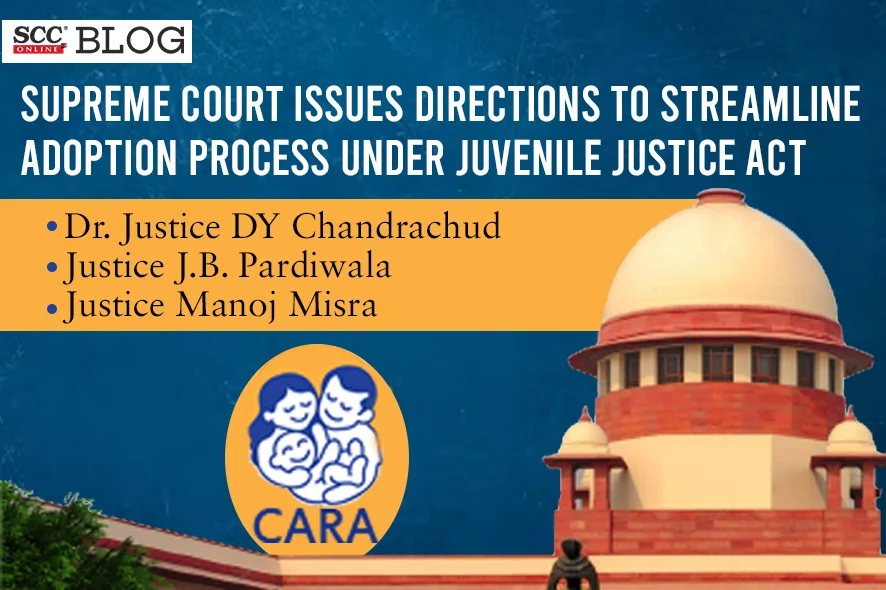Supreme Court: In an ongoing matter regarding the issue of adoption under the Juvenile Justice Act, 2015 (‘JJ Act’), when the Central Adoption and Research Agency (‘CARA’) brought in certain suggestions for the Court’s consideration, the Bench of Dr. DY Chandrachud, CJI, J.B. Pardiwala and Manoj Misra, JJ. issued several directions to ensure a streamlined and expeditious process of adoption.
The Court began with the fact that cases related to adoption of children who were orphaned/ abandoned/ surrendered (‘OAS’) follow the mandate under JJ Act and CARA Regulations, 2022. It further informed about CARA in conjunction with the National Informatics Centre (‘NIC’) having developed a Child Adoption Resource Information and Guidance System (‘CARINGS’), a platform initially designed in 2015 and updated in 2015 aiming to ensure that adoptions under the JJ Act were brought under an online platform.
CARA Statistics for Adoption
Referring to the statistics between 2013 and 2023, the Court highlighted the annual figure of total adoptions which ranged between 3158 (2022-23) to 4362 (2014-15), the CARINGS portal reflected registrations by 33,967 Prospective Adoptive Parents (‘PAPs’) and children registered as on 1-08-2023 were 7107 comprising of 6556 children without any special needs and 1451 children with special needs. Among those, only 2,118 children were considered to be ‘legally free for adoption’ as on 1-08-2023.
The main aim behind CARA approaching the Court was that “generally, PAPs have to wait for between three to four years for getting “a healthy and young child” due to the huge mismatch in the number of registered PAPs and children available for adoption.”
The Court pointed towards the Adoption Regulations, 2022 brought in by the Union Ministry of Women and Child Development on 28-09-2022 which prescribe a specific procedure relating to children for adoption which involves association of several expert agencies, including the State Adoption Regulatory Authorities (‘SARA’), Specialised Adoption Agencies (‘SAA’) and District Child Protection Units (‘DCPU’). These also provide specific timelines for all the authorities and agencies for processing such cases. Despite that, the Court expressed the apparent outcome that the mismatch between the number of children legally available for adoption and PAPs registered on the portal, the process of adoption had become interminably long. The Court also pointed towards the usual preference for young children, more for children within the age group of 0-2 years.
CARA’s Suggestions for Improvement in Adoption under JJ Act
CARA came up with the following suggestions:
-
Ensure expeditious identification of children falling in the OAS category;
-
Revamp administrative infrastructure in the States, particularly, in the SAAs and DCPUs;
-
Ensure that accountability in the maintenance of the timelines laid down for completing every process in the stage of adoption;
-
Compile adequate data to channelise children placed in Foster Care (Children in need of care and protection) into the adoption process; and
-
Clarity on process of adoption under the Hindu Adoption and Maintenance Act (HAMA) to be independent of the process stipulated under the JJ Act 2015.
Identification of Children for Adoption
Taking up each pointer separately, the Court agreed with the first one regarding identification of children and directed the authorities so concerned must carry out an identification drive every 2 months for identification of children in the OAS category in Childcare Institutions within their territories, and the first exercise to be carried out by 7-12-2023.
The Court further directed the nodal department in every State/Union Territory, in-charge of implementing the JJ Act, 2015 to collect and compile specific data on potential children for adoption, their registration, compliance of rules, etc., to be made available to the Secretary in the Union Ministry of Women and Child Development and to the Director CARA on or before 31-01-2024.
Infrastructural Deficiencies
While noting the fact that out of 760 districts in India, only 390 districts have SAAs, which meant that 370 districts lacked a functional SAA, due to which, the process of adoption envisaged in 2022 Regulations could not be completed efficaciously. Therefore, the Court peremptorily directed All States and Union Territories to ensure that within every district falling within their jurisdiction, SAAs to be set up by 31-01-2024.
Adoption under HAMA and JJ Act
The Court noted that adoption under HAMA was independent of 2022 Regulations and that CARA intervenes only when adoption certificate is required by adoptive parents to facilitate adopted child’s travel outside India. The issue revolved around the fact that “although CARA has been processing adoption cases of NRI/OCI PAPs, the receiving countries do not necessarily consider HAMA to be in conformity with the Hague Convention procedure.” On this aspect, the Court directed all States and Union Territories to compile and submit annual data pertaining to HAMA adoptions for 2021, 2022 and 2023 as on 15-01-2023 to CARA Director by 31-01-2024.
All such data be compiled and placed on the record before the Court by 10-02-2024, and CARA to issue directions to all authorities governed by 2022 Regulations to ensure due observance of the required timelines so that the adoption process is streamlined and expedited. The Cout listed the instant matter for next hearing on 12-02-2024.
[The Temple of Healing v. Union of India, 2023 SCC OnLine SC 1590, Order dated 20-11-2023]
Advocates who appeared in this case :
For Petitioner: Advocate Rohan Shah, Advocate Alok Yadav, Advocate on Record Vishnu Kant
For Respondent: Solicitor General of India Tushar Mehta, Additional Solicitor General Aishwarya Bhati, Advocate on Record Gurmeet Singh Makker, Advocate Swati Ghildiyal, Advocate Navanjay Mahapatra, Advocate Padmesh Mishra, Advocate Swarupama Chaturvedi, Advocate Yuvraj Sharma, Advocate Chitrangda Rashtravara, Advocate Kanu Agrawal, Advocate Arkaj Kumar, Advocate Pratyush Srivastav, Advocate Rajat Nair, Advocate on Record Saroj Tripathi, Advocate Naveen Kumar Tripathi, Advocate Abhishek Kumar Singh, Advocate on Record Abdul Azeem Kalebudde, Advocate Ray Vikram Nath







